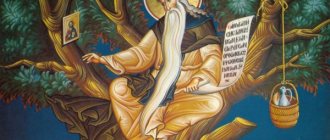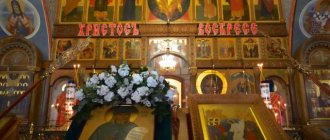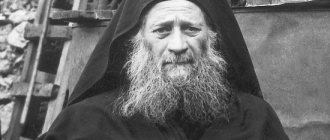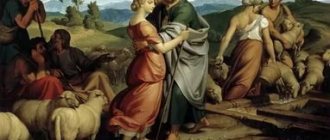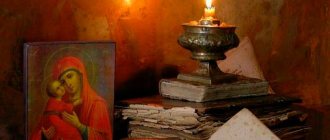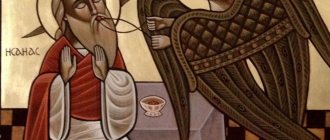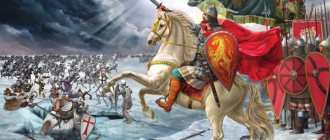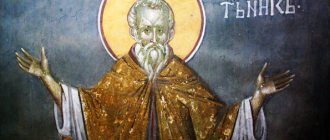Favorite and outcast
Acquaintance with Joseph, one of the youngest sons of the patriarch Jacob, in the Holy Scriptures begins in the 37th chapter of the book of Genesis. We learn that he tended sheep with his brothers and brought bad rumors to his father - in other words, he was a sneak and a gossip. Joseph was also his father's favorite, and all this caused conflict between the brothers. The special clothes that Jacob gave to Joseph, and the latter’s dreams, in which he saw his great future, when his brothers and even his father would bow to him, added fuel to the fire. Joseph had the imprudence to tell his family about them. According to Scripture, the brothers could not even speak friendly to him.
Soon they left to graze the cattle, and Joseph remained at home. Everyone probably breathed a sigh of relief - a short break. But then Jacob asked Joseph to take food to his brothers. Joseph readily took up this task. But when he arrived at the place where the brothers were supposed to stop, they were not there. Another would have sighed with relief: the job was done, and once again the brothers did not catch the eye. But not Joseph. Instead of going home quietly, he sought them out. This attempt to be kind to his brothers and faithful to his father ended with his brothers selling him into slavery.
Lecture 7.2 The offspring of Jacob. About the fate of Patriarch Joseph
Audio |
About the connection between man and God
Let us dedicate this lecture to Patriarch Joseph, one of the sons of Jacob. We will not analyze in detail what happened to him in the land of Egypt: what is important to us is not the outline of his fate, but his image as a prototype of Jesus Christ. The Church testifies to this very clearly during the days of Holy Week, when it is precisely this aspect that the members of the church flock pay attention to.
Joseph is a very bright, poetic, memorable prototype of Jesus Christ. His story is quite well known: he was the eldest of the two sons of Rachel, Jacob's beloved wife, and he behaved in a special way. And, distinguishing him from other sons, his father sewed him multi-colored clothes. He had dreams that his brothers would one day worship him and his father would worship him. He told his dreams, which further aroused the envy and even hatred of his brothers. One day the brothers were far away in the field, and their father sent Joseph to see how they were doing. Joseph went to them, and the brothers decided to kill him. Thank God, it didn’t come to the point of murder - one of the sons, Reuben, opposed it. And when a caravan of merchants passed nearby, the brothers sold him into slavery. Joseph ended up in Egypt, where he was sold on the slave market. As a handsome and young slave, he ended up in the house of the rich courtier Potiphar.
Joseph's affairs went very well because he did not forget God. He was appointed manager of the estate of his courtier, Potiphar trusted him in everything and loved him very much. The servants obeyed the new steward, and the wealth of Potiphar's house increased. But Potiphar's wife was inflamed with passion for the beautiful Joseph and began to persuade him to have an illicit affair. Joseph refused, but the wife, when her husband was not at home, began to pester Joseph, and he ran away, leaving his clothes in her hands. She raised a cry as if he wanted to commit violence against her, and he was thrown into prison. But even in prison, God was with him, because Joseph did not forget Him.
At some time, the warden entrusted everything to Joseph, and he began to distribute food among the prisoners. Everything was fine with him. At some time, two prominent courtiers were thrown into prison by the pharaoh. They had dreams. Joseph interpreted the dreams of both, and they came true - he told one that he would be executed, the other that he would be returned to the palace of Pharaoh; That's how it happened. And he asked the second one to put in a good word for him, since Joseph suffered for nothing. Of course, this man forgot about his promise.
But after some time, Pharaoh saw a dream that no one could interpret. And then the butler remembered that there was a man in prison who could interpret dreams. Joseph is invited to the palace, and he interprets this dream. Pharaoh sees in a dream that seven such fat cows are grazing on the shore, such as no one has ever seen, and then seven skinny cows come out and eat the fat ones. Joseph interpreted it this way: there will be seven very fertile years, when grain will be in abundance, such as has never been before in Egypt. And after the abundance, seven years of famine will come, which will eat up the accumulated grain. And he gave advice to Pharaoh so that he would find a very wise man who could, in years of plenty, store up bread for years of famine. Pharaoh, without hesitation, appointed Joseph to this position. Joseph stockpiled grain, which no one valued and did not save from excess, and accumulated huge reserves. And when the years of famine came, he began to sell this bread at a high price. In a short time, the entire Egyptian people found themselves without their wealth, and then without their lands, and then they all found themselves sold into slavery to the pharaoh himself. Joseph managed to feed not only the Egyptian people, but also their neighbor - his own, his father's family. Patriarch Jacob crossed into Egypt when Joseph was second in command after Pharaoh.
This story is a type of the spiritual work that Christ accomplished. The Holy Spirit, through the life of Patriarch Joseph, testified what would happen with Christ.
Joseph was sold into slavery by his brothers to the pagans - Christ was sold to the pagans: Judas sold Him for 30 pieces of silver, and Christ ended up with a pagan - Pontius Pilate, and the pagans executed Him.
They sold Joseph into slavery, stripped him of his coat of many colors, stained him with the blood of a slain lamb, and took these bloody clothes to Jacob, mocking: “Isn’t this your son’s clothes? He must have been torn to pieces by a wild beast,” saying not “our brother’s clothes,” but “your son,” separating himself from him. Jacob recognized the clothes of his beloved son and cried all his life. Patriarch Jacob thinks about the living Joseph that he is dead.
The apostles - the Church, those disciples to whom Christ was dear - cried, thinking that Christ was dead. They took Him down from the Cross, saw His clothes, the bloody Body (as they say in our liturgical books, the wounded Body of Christ is the bloody clothes of His Flesh, behind which the Divinity is hidden). They, seeing the earthly shell of Jesus Christ, cry, thinking that He died forever, and then rejoice that He is Risen (we truly cannot plunge into the fear and horror of the moment when they lost their beloved Teacher).
For Jacob, the appearance of Joseph is like the resurrection from the dead. He cries, but in fact his son is alive.
Just as Joseph saves his brothers from hunger, so Christ saves His brothers - even when He dies on the Cross, He dies for them. So Joseph goes to the land of Egypt, is sold into slavery to save these brothers, and he saves them.
Joseph ends up in prison and is taken up from prison to heights. Even Pharaoh does not know whom he is elevating as his closest assistants. In fact, Joseph is not an ordinary person and in worldly terms he has a very good pedigree. From the point of view of those traditions and customs, Joseph is not a simple slave, but no one knows about his origin, but is simply taken from prison and taken to heights. How Christ ascends to the height of His ministry, to the Cross, from which He stretches out His hands to His people to save them from judgment.
Christ Ascends to His Heavenly Father. And it is His Ascension to the Father that is the guarantee that He will give us the fruits of the Holy Spirit. One of the gifts of the Holy Spirit is the Eucharist, by which we all live: all members of the Church live by the Eucharist. If He had not ascended to the Father, we would not have been able to receive communion. He says: I ascend to the Father, and if I do not ascend to where I came from, then you cannot receive what gives you life. But Joseph also ascends to a height in order to distribute food from there; he ascends and sits at the right hand of Pharaoh. And we say that Christ sat down at the right hand of the Father.
The ring that Pharaoh gives to Joseph’s hand says that he can control everything in Pharaoh’s house. This is absolute power: Pharaoh only has a higher throne, and Joseph’s power is the same as Pharaoh’s. And Christ says that everything was handed over to Me by My Father - everything that the Father has belongs to Me. Joseph typifies the fullness of authority that Christ will receive.
When Joseph checks on the brothers, they do not recognize him, not knowing that under the Egyptian clothing is their brother. The brothers did not understand that he was the one who had to save them. So the Jewish people did not recognize the Messiah, the One who would save them, under the modest clothing of a simple Jewish villager. Joseph humbled himself and became in every way similar to the environment in which he found himself. After the Baptism in the Spirit, Jesus Christ is taken to the desert, where he fights with Satan and wins.
Joseph is not tempted. With this quality of his, he most of all typifies Christ. Satan approached him in the person of the owner's wife, and Joseph rejected his temptations, remaining pure, beautiful, and faithful to God. And Christ in the desert, rejecting the temptations of the devil, defends His Human freedom and independence from sin.
With his entire life, Joseph typifies the height that will appear in the life of Jesus Christ. For us, the main thing is that Joseph endured, he was in a foreign land, he was a slave, it was difficult for him, he was among a foreign religious environment, but, being there in darkness, he retained faith - trust in God, and that is why God was with him everywhere that Joseph, in all the movements of his soul, was never detached from God. Likewise, Christ in his earthly Incarnation, being in darkness, uses all His will and strength so as not to be torn away from the Spirit.
It is important for us that since such resistance to temptation is possible for Joseph, then we, no matter what darkness we are in, no matter who we are among, can maintain our connection with God everywhere - it depends on us, it is possible. If it was possible for Joseph before Christ came into the world, then even more so it is possible for us.
Slavery in Egypt
Joseph became the slave of Potiphar, one of the close associates of Pharaoh, the king of Egypt. Joseph had more than enough reasons to be offended. Instead of great promises of royal greatness - slavery in a foreign country, far from loved ones. But something was burning inside this young man. He did not give in to bitterness, but on the contrary, served faithfully and diligently to his master. He soon noticed that the new slave was doing a good job and appointed him manager of all his estates. Joseph would hardly have been chosen for this position if he had not been diligent, worked harder than others, and inspired those around him. God was with Joseph, Scripture tells us, and we see how the young man used that to serve others. And the Lord gave him peace - he became a boss, although not so significant.
Results of the comparison. 14 points
Joseph, likeness of Christ
Joseph
- Divine providence prevailed over the envy of his brothers (Gen. 45:5; 50:15-21)
- Joseph—Jacob's beloved son (Gen. 33:2; 37:3)
- Joseph sent on a mission of mercy (Gen. 37:5-11)
- Joseph was rejected by his brothers because of envy (Gen. 37:3-4)
- Joseph is hated for his dreams of exaltation (Gen. 37:3-11)
- Joseph was stripped of his coat of many colors (Gen. 37:18-36)
- Joseph was sold for twenty pieces of silver (Gen. 37:2328)
- Joseph's brothers thought they were rid of him (Gen. 37:28)
- Later, Joseph's brothers had to meet him (Gen. chapters 42,43,44)
- Joseph's brothers lied about what happened to him (Gen. 37:31-34)
- Joseph was tempted and remained pure (Gen. 39:7-12)
- Joseph became a ruler and invited his starving brothers to Egypt (Gen. 45:9-11; 50:20)
- Joseph forgave his brothers (Gen. 45:1-15; 50:15-21)
- Joseph gave his relatives the land of Heshen (Gen. 45:10)
Christ
- Divine providence overcame the wickedness of the Jews (Gen. 3:15; John 10:17,18; Rom. 6:23)
- Jesus is the Only Begotten Son of God (John 3:16)
- Jesus is sent on a mission of salvation (John 1:29; 3:17; Luke 19:10; Rom. 6:23; 1 John 4:14)
- Jesus is rejected by His people because of unbelief (John 1:11,12; Zech. 13:6)
- Jesus was hated because He proclaimed Himself to be king (Matt. 2:1-18; 28:18; Luke 1:26-35; Acts 2:22-30)
- Jesus' clothes were stripped (Matt. 27:35; Mark 15:24; John 19:23,24)
- Jesus was sold for thirty pieces of silver (Matthew 26:15; 27:3-5)
- Jesus' enemies thought they were rid of Him (Mark 15:13,14,29-31; Isa. 53:10-12)
- Later, His enemies had to face His resurrection (1 Cor. 15:1-8)
- Jesus' enemies obtained false witnesses and bribed them to lie about His resurrection (Matthew 28:11-15)
- Jesus was tempted, but did not sin (Matt. 4:111; Heb. 4:15; 1 Pet. 2:22)
- Jesus became a ruler and calls everyone to salvation (Matthew 11:28-30; Mark 16:15-16; John 14:1-4)
- Jesus forgives and has mercy on sinners (Luke 23:34; Mark 16:15,16; Heb. 5:9)
- Jesus is preparing heaven for us (John 14:1-4; Heb. 4:9; Rev. 21:4)
Lessons from Joseph the Beautiful
It is unlikely that we will be able to fully know how Joseph was able to become more than a conqueror in the midst of all these adversities (Rom. 8:37). One thing we know for sure: God was with Joseph. And this young man managed to find in these relationships something that made him invincible, brought more satisfaction than carnal pleasures, provided a source of inspiration and good mood in the midst of the darkest adversities, supported him in a state of shining sun even when everyone around him wanted to darken it. And thus he achieved the great destiny that the Lord had prepared for him.
Perhaps a dark streak that began today or a long time ago, or perhaps in an unknown future, will become the clearest evidence that God is serious about preparing and bringing us to our destiny. And it remains for us to choose how we react to this. Will we use it as a reason to justify sinful pleasures and not try, or, despite everything, remain faithful to God and serve our neighbors?
Sometimes you just need to admit that sitting and trying to clear away the heap of sorrows that has fallen on us is easier than going to serve God and people, giving your best every day and maintaining a good mood, even when there is the darkest darkness in your soul. Will we seek encouragement from people or will we allow God to shine through us so much that as we pass through the valley of death's darkness, we will inspire and encourage others? If we are Christians and strive for God, the Lord is with us! Will we allow this relationship to take precedence over everything else that happens and doesn't happen in our lives, or will we show through our lives that the Lord is not all we need? The choice remains with each of us. Joseph responded to God’s generous call “yes” and went through this entire thorny path even before the arrival of grace, without enjoying the priceless gifts of Jesus Christ’s feat on the cross. And if we don't do this, what excuse can we give?
Focusing on those around you, saying that everyone does this is tantamount to refusing God’s great and generous offer, and signing up in advance for a miserable, incomplete life. If Joseph had been guided by those around him, he would not have even become the head of Potiphar's estate. Having a great destiny, we simply cannot allow ourselves to make excuses: “it will do,” “today you can relax,” “and they do that too.” We don't have time to indulge in sin. “They” can relax and live for their own pleasure, “they” get away with it. But if we want to receive the fullness of divine gifts, we have a completely different, special story.
Stefan Parakhin
The story of long-suffering Job
In very ancient times, there lived a righteous man named Job to the east of Palestine. He was a fair and kind man who always tried throughout his life to please God. The Lord rewarded him with great benefits for his piety. He had many hundreds of large and thousands of small livestock. He was comforted by his large and friendly family: he had seven sons and three daughters.
But the devil was jealous of Job. He began to slander God about the righteous Job: “Is Job fearing God (righteous) for nothing? Take away from him everything he has, will he bless You?” God, in order to show everyone how faithful Job was to Him, and to teach people patience in their suffering, allowed the devil to take away everything that Job had. And so, one day, robbers stole all of Job’s livestock, killed his servants, and a terrible whirlwind from the desert destroyed the house in which Job’s children had gathered, and they all died. But Job not only did not grumble against God, but said: “God gave, God has also taken away: blessed be the name of the Lord.”
».
The shamed devil was not satisfied with this. He again began to slander Job: “A man will give his life everything that he has: but touch his bones, his body (that is, strike him with illness), and you will see whether he will bless you?” God allowed the devil to deprive Job of his health as well. And then Job fell ill with the most terrible disease - leprosy. Then even Job’s wife began to persuade him to say a word of grumbling against God, and his friends, instead of consoling him, only upset the innocent sufferer with their unfair suspicions. But Job remained firm, did not lose hope in God’s mercy and only asked the Lord to testify that he endured everything innocently.
In a conversation with friends , Job prophesied about the Redeemer (the Savior) and the future resurrection: “I know that my Redeemer lives, and on the last day He will raise from the dust this decaying skin of mine, and I will see God in my flesh. I will behold (see) Him myself; it is my eyes, and not the eyes of another, that will see Him.”
(Job.
19
, 25-27).
After this, God, having shown everyone an example of fidelity and patience in His servant Job, Himself appeared and ordered his friends, who looked at Job as a great sinner, to ask him for prayers for themselves. God rewarded His faithful servant. Job's health returned. He again had seven sons and three daughters, and his livestock was twice as large as before, and Job lived another hundred and forty years in honor, calmly, piously and happily.
The story of long-suffering Job teaches us that God sends misfortunes not only for sins, but sometimes God also sends misfortunes to the righteous to further strengthen them in goodness, to shame the devil and to glorify the truth of God. Then the story of Job’s life reveals to us that earthly happiness does not always correspond to a person’s virtuous life and also teaches us to be compassionate towards the unfortunate.
Job, with his innocent suffering and patience, prefigured the Lord Jesus Christ. Therefore, during the days of remembrance of the suffering of Jesus Christ (on Holy Week), a narrative from the book of Job is read in church.
Note
: See the Bible, in the Book of Job.
